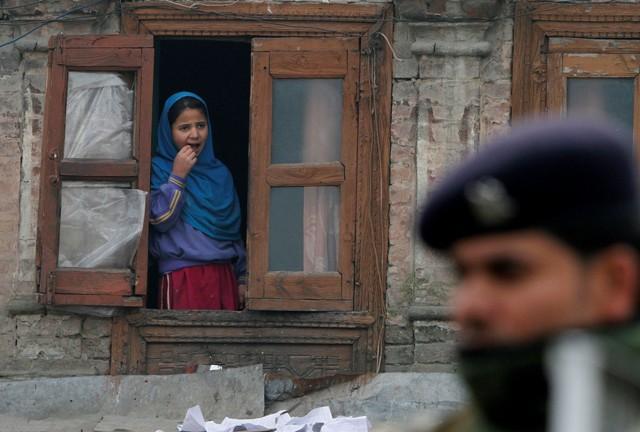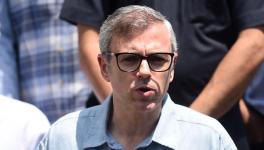'Pervasive Air of Uncertainty': Report on Kashmir by Concerned Citizens' Group

Image for representational purpose. Credit: Counter Currents
Srinagar: A prominent civil society group called the Concerned Citizens Group (CCG), led by Yashwant Sinha, has found that the political ambiance of Srinagar was much more “mistrustful and tense” amid heightened uncertainty in Jammu and Kashmir.
The CCG, which made its tenth visit to the union territory from March 20 to 25, in its latest report released on Saturday said many civil society leaders and friends pleaded “apprehension” in meeting the group. “There seemed to be a pervasive air of uncertainty at the level of the political leadership and on the ground,” the group said.
The group came close on the heels of the Delimitation Commission making its report public. The CCG said this has led to considerable consternation amongst the political parties in the UT, especially those in the Kashmir Valley.
“The political leaders that the CCG met all thought that the delimitation proposed by the present Delimitation Commission was tendentious and was aimed at polarisation of communities,” the report said.
The group, while quoting mainstream political leaders, said that the delimitation exercise had created communal division as well as anxiety by virtually pitching Jammu against the Kashmir Valley.
“They clearly saw “the influence of the Bharatiya Janata Party (BJP) in the delimitation process and pointed out that constituencies had been carved out in Jammu in a manner that would make the BJP more secure in any future election,” CCG said.
The CCG, which claims that it has neither affiliation with the State or any political party, had made visits to both the Kashmir Valley and the Jammu to interact with political leaders, civil society, and business organisations as well as community leaders to assess their perception of the current social and political situation in the region.
The CCG consists of five members including Sinha, former External Affairs Minister; Sushobha Barve, executive secretary, Centre for Dialogue and Reconciliation, Delhi; Wajahat Habibullah (former chairman of the Minorities Commission and the first Chief Information Commissioner of India), Air Vice Marshal (Retd.) Kapil Kak, and Bharat Bhushan, former editor and an independent journalist. The group, however, said that Sinha was not part of the latest visit due to personal reasons, but has endorsed the report.
The report added that despite intermittent announcements by visiting dignitaries from New Delhi, there was complete uncertainty about when an election will be called in J&K. The report said that there is also an expectation of restoration of statehood, but no surety on timing, amid doubts on whether the scheduling of elections in J&K would be before or after such restoration.
“If elections are held to a Union Territory Assembly, then parties would weigh options on levels of participation, although boycott of elections is not planned,” the report stated.
During the visit, the CCG members said it met several mainstream political leaders including former chief ministers Farooq Abdullah and Omar Abdullah of the National Conference, Peoples’ Conference chairman Sajjad Lone, chief spokesperson of the Peoples’ Alliance for Gupkar Declaration Mohammad Yusuf Tarigami of the Communist Party of India (Marxist) among others, civil society and business leaders, trade organisations, journalists, village panchayat heads, and community leaders both in Srinagar and Jammu.
Talking about the diminishing press freedom in the region, the report said that the general impression of CCG was that the media has increasingly been put on a tight leash. “There was a sense of fear amongst media practitioners. Even journalists who the CCG members had met earlier were scared of meeting us for fear of being targeted by the administration which monitored their movement and interactions,” the group said.
“Surveillance typifies and brackets you. You are also branded by your reports and the people you meet. That is then used to define your journalism and based on that you can be denied access to the administration and your reporting thwarted,” a senior journalist said in the report.
In the aftermath of abrogation of Article 370, the report said, a sense of “disaffection” had seeped in even in the Jammu region. “As the weeks and months passed, people began to come to terms with how the changes might affect them – especially land ownership and jobs, which were thrown open to people from outside J&K,” the report said.
The civil society members observed “anger, frustration and disillusionment” set-in Jammu post August 5, 2019, the day central government abrogated Article 370 and 35 A and divided the erstwhile state into two union territories – a decision that people in Jammu seemingly endorsed but since then “Jammu became virtually a city of protests,” the group has observed.
The report also mentioned that people in Jammu have alleged that the Delimitation Commission report was “prepared in the BJP office” and then stamped by the Commission.
“Jammuites have not accepted the down-gradating of the erstwhile J&K state to a Union Territory. This remains an overwhelming sentiment across all communities and professional groups across the region,” the report stated.
Get the latest reports & analysis with people's perspective on Protests, movements & deep analytical videos, discussions of the current affairs in your Telegram app. Subscribe to NewsClick's Telegram channel & get Real-Time updates on stories, as they get published on our website.
























